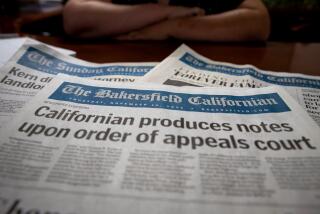Cooperation: Did it break the code?
- Share via
These days, it’s hard to tell whether the words “journalistic ethics” describe a code of conduct or a battleground.
It probably would be easier on everybody if either or both were completely true. Unfortunately, they aren’t.
The practices most reporters and editors recognize as ethical journalism are not part of a formal code. Rather, they are a set of customs and restraints that have come to be generally accepted over time because experience has shown they are requisite to doing honest work. The contention now surrounding them seems less like a battlefield than it does a barroom brawl in which everyone is a participant but there are no clear sides.
That’s one of the reasons the press periodically finds itself enmeshed in convoluted bouts of soul-searching, such as the one that originated this week in Wichita, Kan.
Authorities there finally have arrested a man they allege is the serial killer who periodically preyed on the community for more than 30 years. The killer went by the charming acronym BTK, which described his modus operandi: bind, torture, kill. Over the decades, he frequently communicated with the police through messages delivered to the local news media.
In many instances, investigators asked the reporters and broadcasters who received the material to withhold from their reports certain facts the killer relayed to them or to refrain from describing physical evidence he sent them, such as a doll that had been hooded and had its arms bound behind its back. In one recent instance, the local ABC television affiliate agreed not to broadcast a puzzle the killer had sent, which turned out to include both the name and address of the suspect now in custody.
Late this week, two reporters and the author of a forthcoming nonfiction book on the case told The Times’ P.J. Huffstutter and Stephanie Simon that they now have second thoughts about their decisions to cooperate with the police. The author, Robert Beattie, also withheld the puzzle and now says that he’s “really wondering if I made a mistake and the police made a mistake by not releasing this information sooner.” Hurst Laviana, the Wichita Eagle reporter whose anniversary story on the crimes appears to have goaded BTK to resume contact with the press after a 25-year silence, told The Times reporters, “I wonder now whether we did the right thing, of editing the evidence. Would the police have been able to find a suspect sooner? Did we do the public a disservice?”
Naturally, things being what they are nowadays, the moral arbiters who loiter about the Internet and other places looking for opportunities to pass judgment on all and sundry have been only too happy to engage Laviana’s question. What is surprising is how many of them seem to think that the questions at issue are in any way difficult.
First of all, it’s important to remember that -- whatever they may or may not be -- journalistic ethics are not like those that govern law, medicine or architecture. The so-called learned professions license their members and operate according to legal statutes that set standards of education and training and impose written codes of conduct binding on all license-holders. State-sanctioned regulatory bodies police the profession and have the power to punish or even expel any member who violates the code.
Our constitutional guarantee of a free press precludes such arrangements, because the 1st Amendment’s rights belong to individuals and not institutions. Thus, journalism is a vocation rather than a profession. Nobody gets to set up standards of admission or practice because journalism is the public expression of a right enjoyed by everyone who lives under the rule of the U.S. Constitution. (That’s why people who sputter apoplectically over the notion that bloggers are entitled to the same legal protections as newspaper reporters or network anchors are simply out to lunch.)
This doesn’t mean that there aren’t ethical norms on which sane and responsible reporters, editors and commentators can agree. Obviously, you shouldn’t make things up. You should not steal other people’s work. Conflicts of interest, whether material or personal, should be avoided. This is all pretty commonsensical, which is why unethical journalism is like Justice Potter Stewart’s nicely functional definition of pornography:
You know it when you see it.
Armstrong Williams, bribe-taker. Bad.
Jack Kelley, fabulist. Bad.
Jayson Blair, fabulist and plagiarist. Very bad.
Etc.
So, were the Wichita reporters behaving ethically when they complied with authorities’ requests to withhold information from their readers and viewers?
Of course they were. In the general course of things, it’s obviously true that newspapers and broadcasters should not allow government officials to dictate what they report. But murder investigations -- particularly those involving sadistic, demented serial killers -- hardly occur in “the general course of things.” An ethical system that dictates that you should never cooperate with authorities is as destructive as one that says you must always cooperate.
This is not a proposition that puts one on the slippery path to relativism. Ethical codes are guides to moral reasoning, and the serious ones are those that acknowledge that life is messy and makes conflicting claims. Thus the need for exceptions. The Talmud, which is the oldest ethical system in continuous use, allows the suspension of its injunctions to save a life. Thomas Aquinas put the matter clearly in the High Middle Ages: “Necessity knows no law.”
Cooperating with the police in the conduct of a murder investigation is not ethical compromise. It is collaboration in the defense of society, which is a basic human obligation from which the practice of journalism does not relieve us. Reporters and writers stand apart from society as a way of serving the common good and not because they’re indifferent to its claims.
More to Read
Sign up for Essential California
The most important California stories and recommendations in your inbox every morning.
You may occasionally receive promotional content from the Los Angeles Times.










